Analysis of Contemporary Management Capabilities: MGT802 Report
VerifiedAdded on 2022/11/13
|7
|1682
|341
Report
AI Summary
This report, prepared for MGT802, delves into the realm of contemporary management capabilities, examining key skills crucial for effective leadership and organizational success. The report explores various facets of contemporary management, including optimism, work ethics, service orientation, servant leadership, resilience, critical thinking, leadership, and communication. Each skill is defined and discussed in the context of its importance within a modern business environment. The report also emphasizes the need for ethical considerations and the importance of effective communication. The conclusion underscores the impact of these capabilities on employee productivity and overall organizational performance, providing insights into how these skills can be cultivated and applied to address challenges within the workplace. The report uses scholarly references to support its arguments.
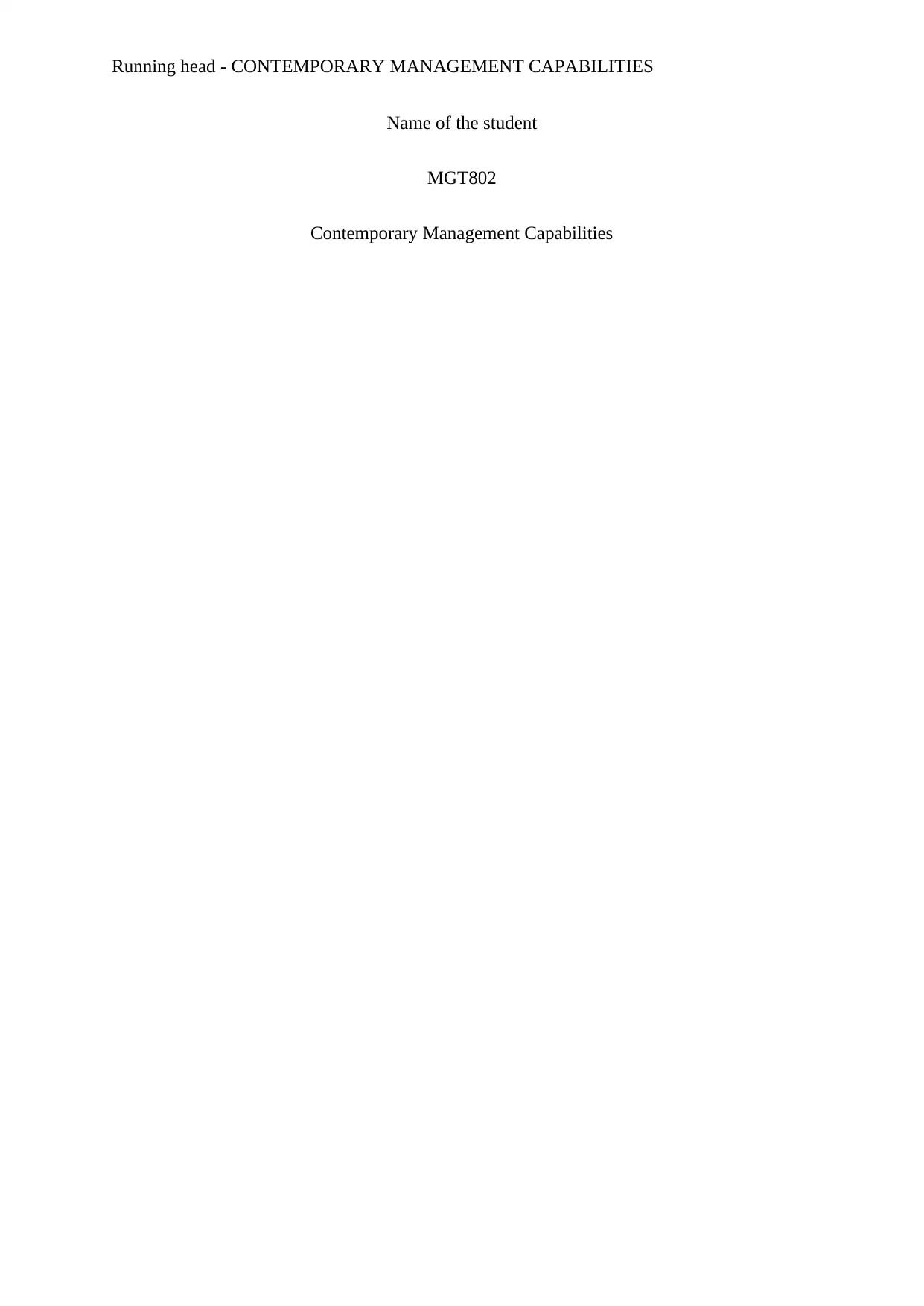
Running head - CONTEMPORARY MANAGEMENT CAPABILITIES
Name of the student
MGT802
Contemporary Management Capabilities
Name of the student
MGT802
Contemporary Management Capabilities
Paraphrase This Document
Need a fresh take? Get an instant paraphrase of this document with our AI Paraphraser
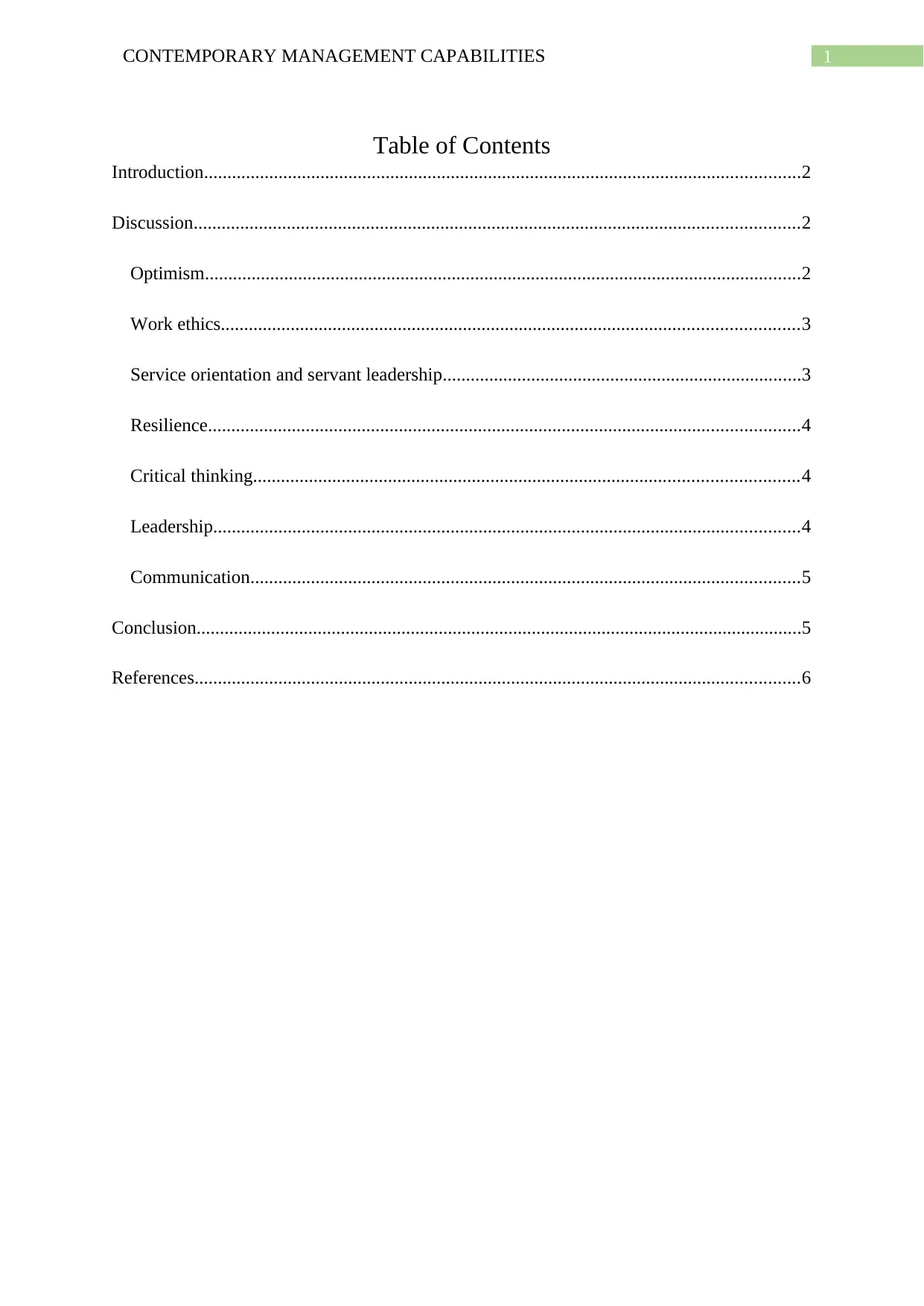
1CONTEMPORARY MANAGEMENT CAPABILITIES
Table of Contents
Introduction................................................................................................................................2
Discussion..................................................................................................................................2
Optimism................................................................................................................................2
Work ethics............................................................................................................................3
Service orientation and servant leadership.............................................................................3
Resilience...............................................................................................................................4
Critical thinking.....................................................................................................................4
Leadership..............................................................................................................................4
Communication......................................................................................................................5
Conclusion..................................................................................................................................5
References..................................................................................................................................6
Table of Contents
Introduction................................................................................................................................2
Discussion..................................................................................................................................2
Optimism................................................................................................................................2
Work ethics............................................................................................................................3
Service orientation and servant leadership.............................................................................3
Resilience...............................................................................................................................4
Critical thinking.....................................................................................................................4
Leadership..............................................................................................................................4
Communication......................................................................................................................5
Conclusion..................................................................................................................................5
References..................................................................................................................................6
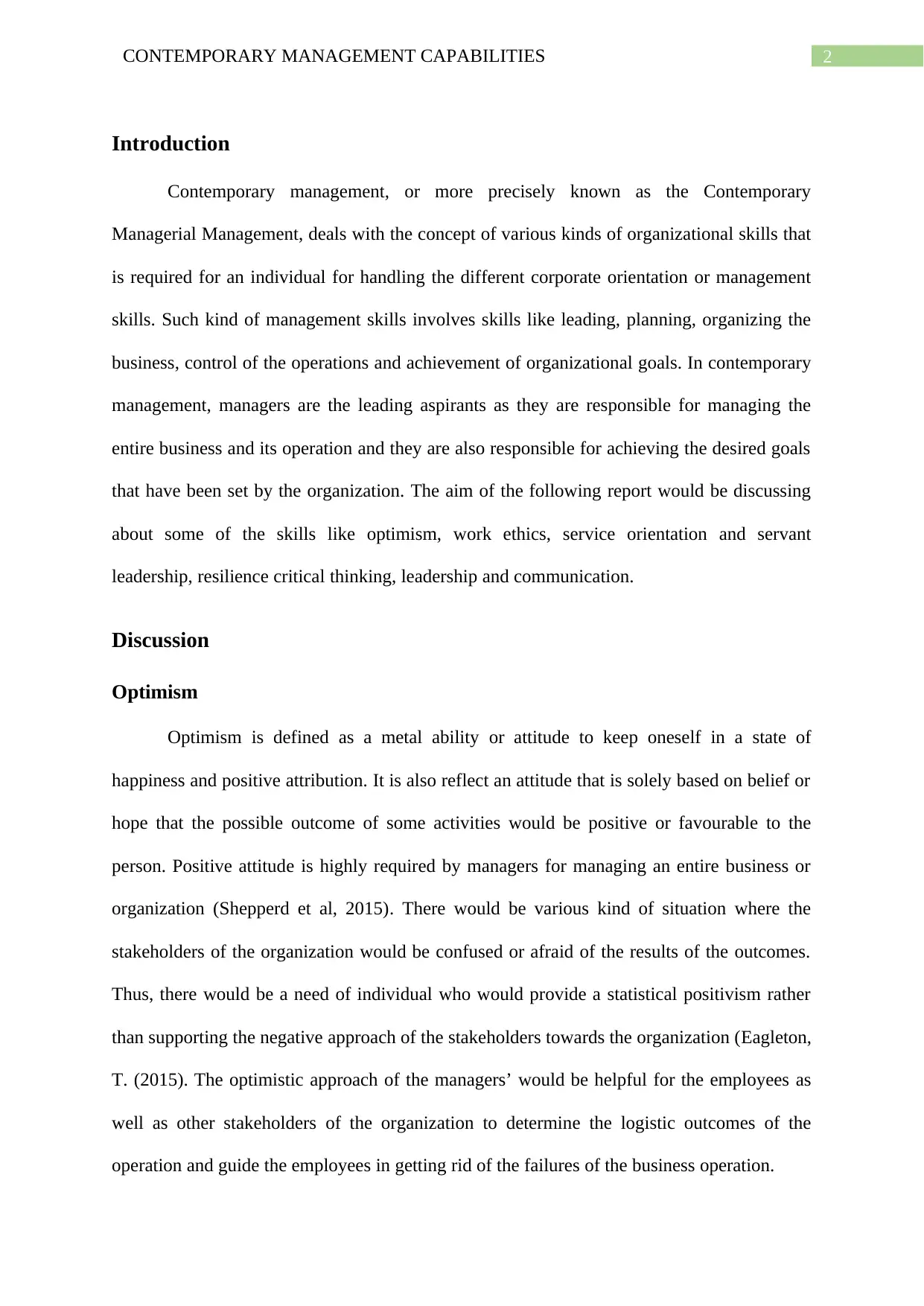
2CONTEMPORARY MANAGEMENT CAPABILITIES
Introduction
Contemporary management, or more precisely known as the Contemporary
Managerial Management, deals with the concept of various kinds of organizational skills that
is required for an individual for handling the different corporate orientation or management
skills. Such kind of management skills involves skills like leading, planning, organizing the
business, control of the operations and achievement of organizational goals. In contemporary
management, managers are the leading aspirants as they are responsible for managing the
entire business and its operation and they are also responsible for achieving the desired goals
that have been set by the organization. The aim of the following report would be discussing
about some of the skills like optimism, work ethics, service orientation and servant
leadership, resilience critical thinking, leadership and communication.
Discussion
Optimism
Optimism is defined as a metal ability or attitude to keep oneself in a state of
happiness and positive attribution. It is also reflect an attitude that is solely based on belief or
hope that the possible outcome of some activities would be positive or favourable to the
person. Positive attitude is highly required by managers for managing an entire business or
organization (Shepperd et al, 2015). There would be various kind of situation where the
stakeholders of the organization would be confused or afraid of the results of the outcomes.
Thus, there would be a need of individual who would provide a statistical positivism rather
than supporting the negative approach of the stakeholders towards the organization (Eagleton,
T. (2015). The optimistic approach of the managers’ would be helpful for the employees as
well as other stakeholders of the organization to determine the logistic outcomes of the
operation and guide the employees in getting rid of the failures of the business operation.
Introduction
Contemporary management, or more precisely known as the Contemporary
Managerial Management, deals with the concept of various kinds of organizational skills that
is required for an individual for handling the different corporate orientation or management
skills. Such kind of management skills involves skills like leading, planning, organizing the
business, control of the operations and achievement of organizational goals. In contemporary
management, managers are the leading aspirants as they are responsible for managing the
entire business and its operation and they are also responsible for achieving the desired goals
that have been set by the organization. The aim of the following report would be discussing
about some of the skills like optimism, work ethics, service orientation and servant
leadership, resilience critical thinking, leadership and communication.
Discussion
Optimism
Optimism is defined as a metal ability or attitude to keep oneself in a state of
happiness and positive attribution. It is also reflect an attitude that is solely based on belief or
hope that the possible outcome of some activities would be positive or favourable to the
person. Positive attitude is highly required by managers for managing an entire business or
organization (Shepperd et al, 2015). There would be various kind of situation where the
stakeholders of the organization would be confused or afraid of the results of the outcomes.
Thus, there would be a need of individual who would provide a statistical positivism rather
than supporting the negative approach of the stakeholders towards the organization (Eagleton,
T. (2015). The optimistic approach of the managers’ would be helpful for the employees as
well as other stakeholders of the organization to determine the logistic outcomes of the
operation and guide the employees in getting rid of the failures of the business operation.
⊘ This is a preview!⊘
Do you want full access?
Subscribe today to unlock all pages.

Trusted by 1+ million students worldwide
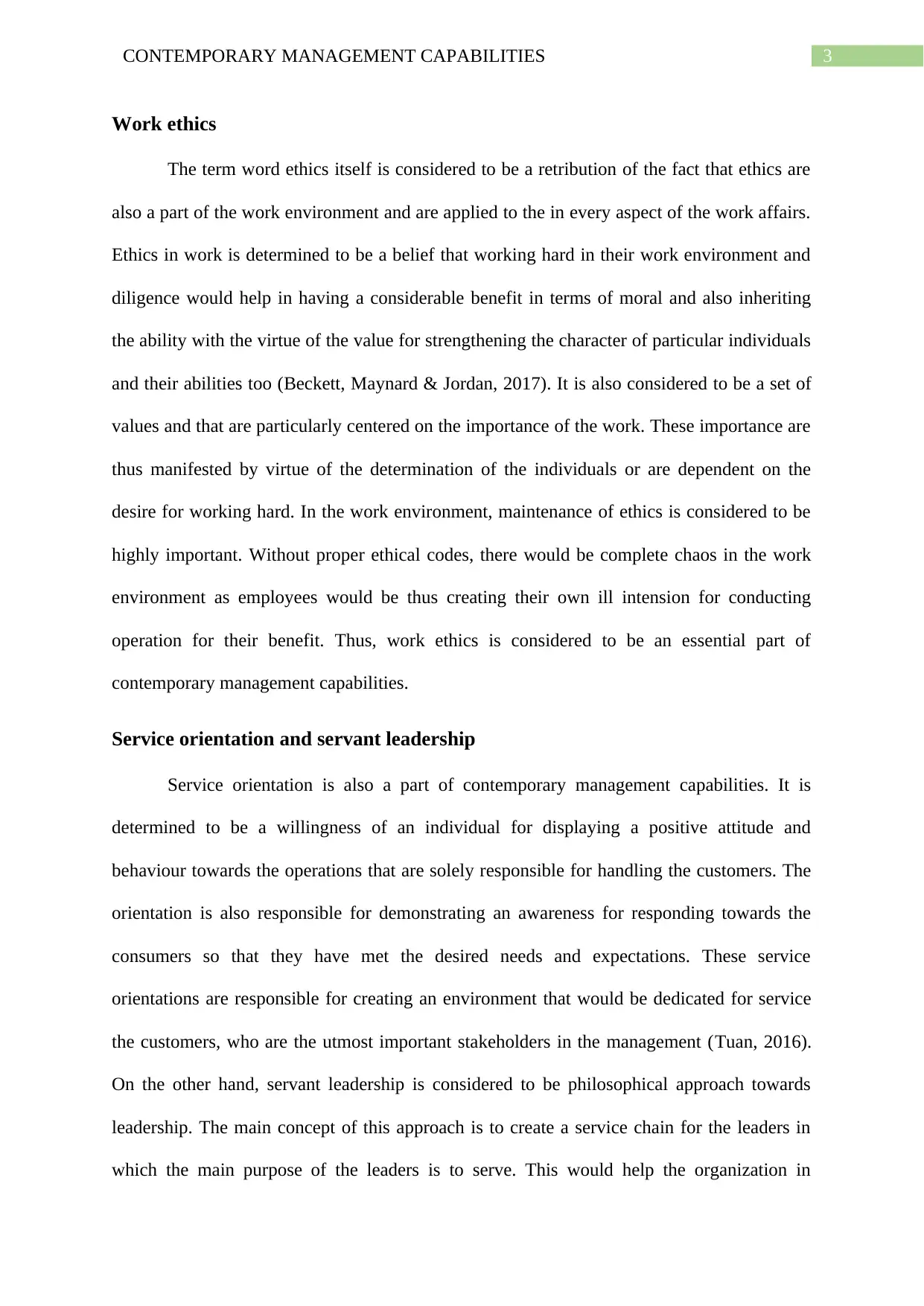
3CONTEMPORARY MANAGEMENT CAPABILITIES
Work ethics
The term word ethics itself is considered to be a retribution of the fact that ethics are
also a part of the work environment and are applied to the in every aspect of the work affairs.
Ethics in work is determined to be a belief that working hard in their work environment and
diligence would help in having a considerable benefit in terms of moral and also inheriting
the ability with the virtue of the value for strengthening the character of particular individuals
and their abilities too (Beckett, Maynard & Jordan, 2017). It is also considered to be a set of
values and that are particularly centered on the importance of the work. These importance are
thus manifested by virtue of the determination of the individuals or are dependent on the
desire for working hard. In the work environment, maintenance of ethics is considered to be
highly important. Without proper ethical codes, there would be complete chaos in the work
environment as employees would be thus creating their own ill intension for conducting
operation for their benefit. Thus, work ethics is considered to be an essential part of
contemporary management capabilities.
Service orientation and servant leadership
Service orientation is also a part of contemporary management capabilities. It is
determined to be a willingness of an individual for displaying a positive attitude and
behaviour towards the operations that are solely responsible for handling the customers. The
orientation is also responsible for demonstrating an awareness for responding towards the
consumers so that they have met the desired needs and expectations. These service
orientations are responsible for creating an environment that would be dedicated for service
the customers, who are the utmost important stakeholders in the management (Tuan, 2016).
On the other hand, servant leadership is considered to be philosophical approach towards
leadership. The main concept of this approach is to create a service chain for the leaders in
which the main purpose of the leaders is to serve. This would help the organization in
Work ethics
The term word ethics itself is considered to be a retribution of the fact that ethics are
also a part of the work environment and are applied to the in every aspect of the work affairs.
Ethics in work is determined to be a belief that working hard in their work environment and
diligence would help in having a considerable benefit in terms of moral and also inheriting
the ability with the virtue of the value for strengthening the character of particular individuals
and their abilities too (Beckett, Maynard & Jordan, 2017). It is also considered to be a set of
values and that are particularly centered on the importance of the work. These importance are
thus manifested by virtue of the determination of the individuals or are dependent on the
desire for working hard. In the work environment, maintenance of ethics is considered to be
highly important. Without proper ethical codes, there would be complete chaos in the work
environment as employees would be thus creating their own ill intension for conducting
operation for their benefit. Thus, work ethics is considered to be an essential part of
contemporary management capabilities.
Service orientation and servant leadership
Service orientation is also a part of contemporary management capabilities. It is
determined to be a willingness of an individual for displaying a positive attitude and
behaviour towards the operations that are solely responsible for handling the customers. The
orientation is also responsible for demonstrating an awareness for responding towards the
consumers so that they have met the desired needs and expectations. These service
orientations are responsible for creating an environment that would be dedicated for service
the customers, who are the utmost important stakeholders in the management (Tuan, 2016).
On the other hand, servant leadership is considered to be philosophical approach towards
leadership. The main concept of this approach is to create a service chain for the leaders in
which the main purpose of the leaders is to serve. This would help the organization in
Paraphrase This Document
Need a fresh take? Get an instant paraphrase of this document with our AI Paraphraser
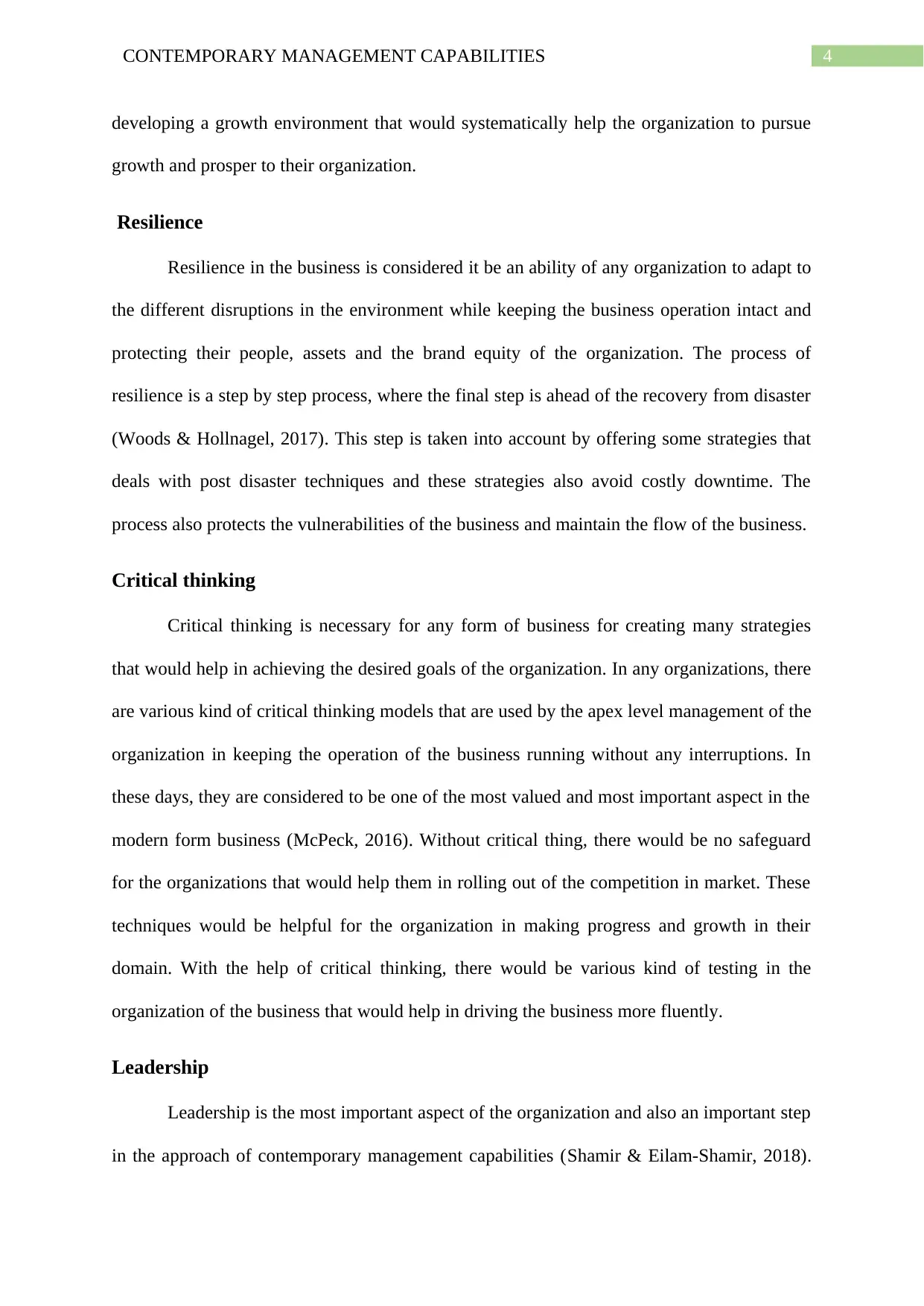
4CONTEMPORARY MANAGEMENT CAPABILITIES
developing a growth environment that would systematically help the organization to pursue
growth and prosper to their organization.
Resilience
Resilience in the business is considered it be an ability of any organization to adapt to
the different disruptions in the environment while keeping the business operation intact and
protecting their people, assets and the brand equity of the organization. The process of
resilience is a step by step process, where the final step is ahead of the recovery from disaster
(Woods & Hollnagel, 2017). This step is taken into account by offering some strategies that
deals with post disaster techniques and these strategies also avoid costly downtime. The
process also protects the vulnerabilities of the business and maintain the flow of the business.
Critical thinking
Critical thinking is necessary for any form of business for creating many strategies
that would help in achieving the desired goals of the organization. In any organizations, there
are various kind of critical thinking models that are used by the apex level management of the
organization in keeping the operation of the business running without any interruptions. In
these days, they are considered to be one of the most valued and most important aspect in the
modern form business (McPeck, 2016). Without critical thing, there would be no safeguard
for the organizations that would help them in rolling out of the competition in market. These
techniques would be helpful for the organization in making progress and growth in their
domain. With the help of critical thinking, there would be various kind of testing in the
organization of the business that would help in driving the business more fluently.
Leadership
Leadership is the most important aspect of the organization and also an important step
in the approach of contemporary management capabilities (Shamir & Eilam-Shamir, 2018).
developing a growth environment that would systematically help the organization to pursue
growth and prosper to their organization.
Resilience
Resilience in the business is considered it be an ability of any organization to adapt to
the different disruptions in the environment while keeping the business operation intact and
protecting their people, assets and the brand equity of the organization. The process of
resilience is a step by step process, where the final step is ahead of the recovery from disaster
(Woods & Hollnagel, 2017). This step is taken into account by offering some strategies that
deals with post disaster techniques and these strategies also avoid costly downtime. The
process also protects the vulnerabilities of the business and maintain the flow of the business.
Critical thinking
Critical thinking is necessary for any form of business for creating many strategies
that would help in achieving the desired goals of the organization. In any organizations, there
are various kind of critical thinking models that are used by the apex level management of the
organization in keeping the operation of the business running without any interruptions. In
these days, they are considered to be one of the most valued and most important aspect in the
modern form business (McPeck, 2016). Without critical thing, there would be no safeguard
for the organizations that would help them in rolling out of the competition in market. These
techniques would be helpful for the organization in making progress and growth in their
domain. With the help of critical thinking, there would be various kind of testing in the
organization of the business that would help in driving the business more fluently.
Leadership
Leadership is the most important aspect of the organization and also an important step
in the approach of contemporary management capabilities (Shamir & Eilam-Shamir, 2018).
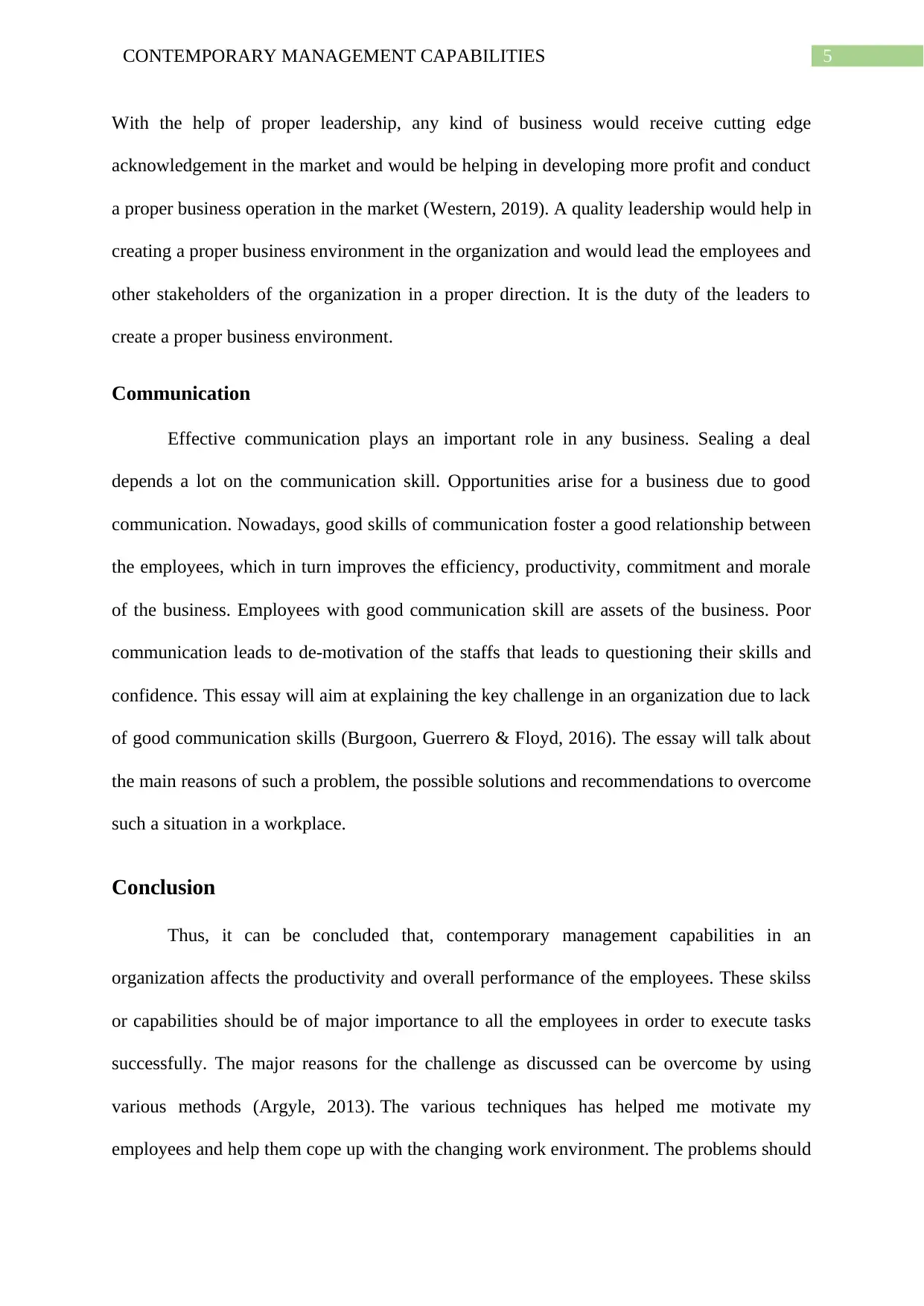
5CONTEMPORARY MANAGEMENT CAPABILITIES
With the help of proper leadership, any kind of business would receive cutting edge
acknowledgement in the market and would be helping in developing more profit and conduct
a proper business operation in the market (Western, 2019). A quality leadership would help in
creating a proper business environment in the organization and would lead the employees and
other stakeholders of the organization in a proper direction. It is the duty of the leaders to
create a proper business environment.
Communication
Effective communication plays an important role in any business. Sealing a deal
depends a lot on the communication skill. Opportunities arise for a business due to good
communication. Nowadays, good skills of communication foster a good relationship between
the employees, which in turn improves the efficiency, productivity, commitment and morale
of the business. Employees with good communication skill are assets of the business. Poor
communication leads to de-motivation of the staffs that leads to questioning their skills and
confidence. This essay will aim at explaining the key challenge in an organization due to lack
of good communication skills (Burgoon, Guerrero & Floyd, 2016). The essay will talk about
the main reasons of such a problem, the possible solutions and recommendations to overcome
such a situation in a workplace.
Conclusion
Thus, it can be concluded that, contemporary management capabilities in an
organization affects the productivity and overall performance of the employees. These skilss
or capabilities should be of major importance to all the employees in order to execute tasks
successfully. The major reasons for the challenge as discussed can be overcome by using
various methods (Argyle, 2013). The various techniques has helped me motivate my
employees and help them cope up with the changing work environment. The problems should
With the help of proper leadership, any kind of business would receive cutting edge
acknowledgement in the market and would be helping in developing more profit and conduct
a proper business operation in the market (Western, 2019). A quality leadership would help in
creating a proper business environment in the organization and would lead the employees and
other stakeholders of the organization in a proper direction. It is the duty of the leaders to
create a proper business environment.
Communication
Effective communication plays an important role in any business. Sealing a deal
depends a lot on the communication skill. Opportunities arise for a business due to good
communication. Nowadays, good skills of communication foster a good relationship between
the employees, which in turn improves the efficiency, productivity, commitment and morale
of the business. Employees with good communication skill are assets of the business. Poor
communication leads to de-motivation of the staffs that leads to questioning their skills and
confidence. This essay will aim at explaining the key challenge in an organization due to lack
of good communication skills (Burgoon, Guerrero & Floyd, 2016). The essay will talk about
the main reasons of such a problem, the possible solutions and recommendations to overcome
such a situation in a workplace.
Conclusion
Thus, it can be concluded that, contemporary management capabilities in an
organization affects the productivity and overall performance of the employees. These skilss
or capabilities should be of major importance to all the employees in order to execute tasks
successfully. The major reasons for the challenge as discussed can be overcome by using
various methods (Argyle, 2013). The various techniques has helped me motivate my
employees and help them cope up with the changing work environment. The problems should
⊘ This is a preview!⊘
Do you want full access?
Subscribe today to unlock all pages.

Trusted by 1+ million students worldwide
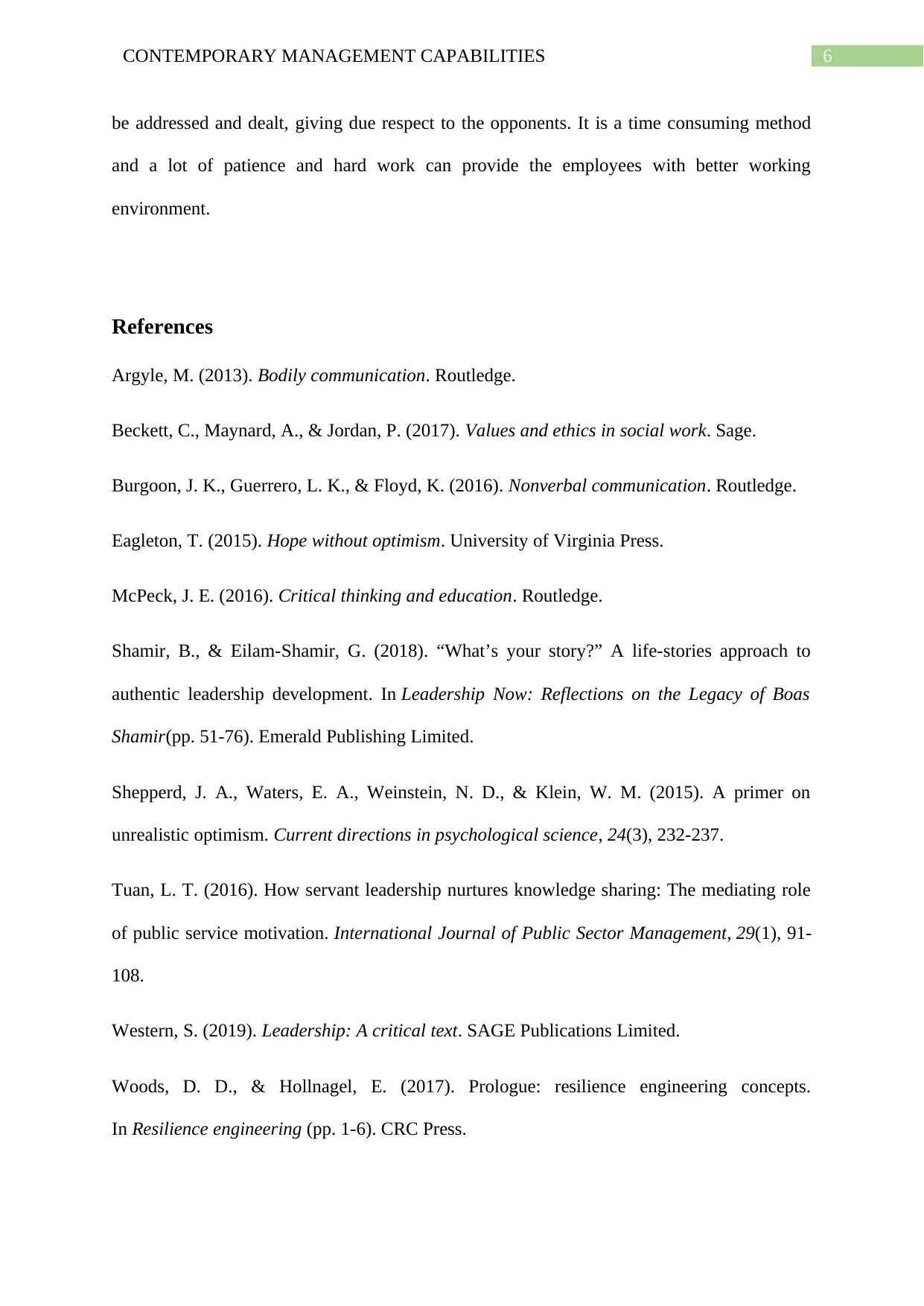
6CONTEMPORARY MANAGEMENT CAPABILITIES
be addressed and dealt, giving due respect to the opponents. It is a time consuming method
and a lot of patience and hard work can provide the employees with better working
environment.
References
Argyle, M. (2013). Bodily communication. Routledge.
Beckett, C., Maynard, A., & Jordan, P. (2017). Values and ethics in social work. Sage.
Burgoon, J. K., Guerrero, L. K., & Floyd, K. (2016). Nonverbal communication. Routledge.
Eagleton, T. (2015). Hope without optimism. University of Virginia Press.
McPeck, J. E. (2016). Critical thinking and education. Routledge.
Shamir, B., & Eilam-Shamir, G. (2018). “What’s your story?” A life-stories approach to
authentic leadership development. In Leadership Now: Reflections on the Legacy of Boas
Shamir(pp. 51-76). Emerald Publishing Limited.
Shepperd, J. A., Waters, E. A., Weinstein, N. D., & Klein, W. M. (2015). A primer on
unrealistic optimism. Current directions in psychological science, 24(3), 232-237.
Tuan, L. T. (2016). How servant leadership nurtures knowledge sharing: The mediating role
of public service motivation. International Journal of Public Sector Management, 29(1), 91-
108.
Western, S. (2019). Leadership: A critical text. SAGE Publications Limited.
Woods, D. D., & Hollnagel, E. (2017). Prologue: resilience engineering concepts.
In Resilience engineering (pp. 1-6). CRC Press.
be addressed and dealt, giving due respect to the opponents. It is a time consuming method
and a lot of patience and hard work can provide the employees with better working
environment.
References
Argyle, M. (2013). Bodily communication. Routledge.
Beckett, C., Maynard, A., & Jordan, P. (2017). Values and ethics in social work. Sage.
Burgoon, J. K., Guerrero, L. K., & Floyd, K. (2016). Nonverbal communication. Routledge.
Eagleton, T. (2015). Hope without optimism. University of Virginia Press.
McPeck, J. E. (2016). Critical thinking and education. Routledge.
Shamir, B., & Eilam-Shamir, G. (2018). “What’s your story?” A life-stories approach to
authentic leadership development. In Leadership Now: Reflections on the Legacy of Boas
Shamir(pp. 51-76). Emerald Publishing Limited.
Shepperd, J. A., Waters, E. A., Weinstein, N. D., & Klein, W. M. (2015). A primer on
unrealistic optimism. Current directions in psychological science, 24(3), 232-237.
Tuan, L. T. (2016). How servant leadership nurtures knowledge sharing: The mediating role
of public service motivation. International Journal of Public Sector Management, 29(1), 91-
108.
Western, S. (2019). Leadership: A critical text. SAGE Publications Limited.
Woods, D. D., & Hollnagel, E. (2017). Prologue: resilience engineering concepts.
In Resilience engineering (pp. 1-6). CRC Press.
1 out of 7
Related Documents
Your All-in-One AI-Powered Toolkit for Academic Success.
+13062052269
info@desklib.com
Available 24*7 on WhatsApp / Email
![[object Object]](/_next/static/media/star-bottom.7253800d.svg)
Unlock your academic potential
Copyright © 2020–2026 A2Z Services. All Rights Reserved. Developed and managed by ZUCOL.





